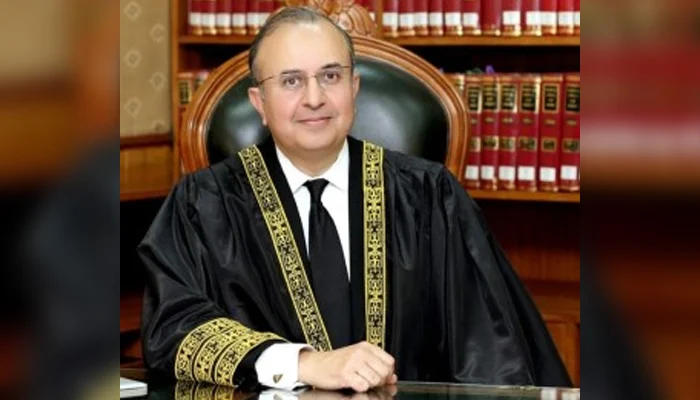Justice Mansoor Ali Shah says appropriate to recuse from bench amid doubts

As a result of the government’s objection, Justice Mansoor Ali Shah recused himself.
In case of doubt, Justice Shah should recuse himself.
In a note, the judge confirms that the petitioner is a relative.
In his decision to recuse himself from hearing a petition challenging the trial of civilians in military courts, senior Supreme Court judge Syed Mansoor Ali Shah said if ordinary people have doubts about a judge’s impartiality, it is appropriate to do so.
In a written order, a six-member bench of the Supreme Court addressed the petitions challenging civilian trials in military courts.
As a result of Justice Shah’s association with petitioner and former chief justice Khawaja, the government objected to his inclusion on the bench.
Justice Shah stated in a separate note that judges should not readily accept a request for their recusal and would decide the matter after properly weighing the grounds for such a request.
When it is evident that the appearance of impartiality is being created for some ulterior motive without any credible basis, the judge should not surrender and abdicate his duties.
It is however safer for the judge to accept such a request in order to maintain public trust in the integrity and impartiality of the court if it is based on a reasonable ground that could genuinely raise doubts in the mind of a common person about the impartiality of the judge.
A common person may not understand the difference between a petition filed in the public interest and one filed for personal interest in this case, as the petitioner is my relative.
Furthermore, he considered it preferable to accept the request and recuse himself in the present case.
Considering the above principles and reasons, I recuse myself from hearing these petitions as a safeguard of public trust in the court’s integrity and impartiality, as the learned Attorney-General for Pakistan raised an objection on behalf of the Federal Government,” said Justice Shah.
In the opinion of the senior judge, it is fundamental to see justice done, and not just have it done, but to see it manifestly and unquestionably.
It is my firm belief that Lord Hewart’s dictum is true, and I have expressed similar views in several cases that the judicial institution’s real strength lies in the public trust which gives legitimacy and public acceptance to its decisions,” the judge said.
In addition, Justice Shah said anything that undermined or threatened the public’s confidence in the integrity, impartiality, and independence of the judiciary should be avoided.
My relative, Jawad S. Khawaja, is the petitioner in one of these petitions. I told the legal fraternity this fact and asked those who were unaware of it whether they had any objections to my hearing these petitions in open court on June 22.
According to Justice Mansoor Ali Shah, counsel for the petitioners and Pakistan’s Attorney-General have no objections to all these petitions.
The judge further said that Article 4 of the Code of Conduct to be observed by the judges of the supreme court and high courts mandates that a “Judge must decline resolutely to act in a case involving his own interests, as well as the interests of close relatives or friends.”
The petitioner, however, has filed the petition for the public interest, and has no personal interest in the outcome of these cases. “Thus, I thought that it was appropriate to ask the parties whether they had any objection to my sitting on the bench and hearing these petitions at the beginning of the hearing,” Justice Shah said.
As I believed my recusal without objection from any of the parties to hearing these petitions would amount to abdication of my duty to preserve, protect, and defend the Constitution in a matter of constitutional significance and public importance concerning the enforcement of the fundamental rights to life, liberty, dignity, due process, and a fair trial, I did not recuse myself from hearing them on my own.
According to him, judicial impartiality ensures public trust, maintains the rule of law, ensures fair trials, and safeguards democracy.
The principle of judicial impartiality, therefore, is not merely a moral imperative, but a practical necessity in order to ensure justice, uphold democratic values, protect citizens’ rights, and maintain societal order.
